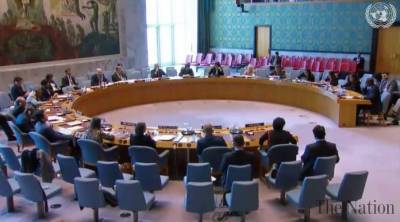Pakistan strongly raised Kashmir and Palestine issue at UNSC, condemned Indian and Israeli occupying forces
Shares

NEW YORK - Pakistan has again called for a just and lasting resolution of the Kashmir dispute, which along with the Palestine issue needs the to be addressed by the U.N. Security Council, to promote international peace and security.
Speaking in the 15-member Council’s debate on the situation in the Middle East, Pakistan’s Ambassador to the UN, Maleeha Lodhi, pointed out that these disputes had remained on the agenda of the UN almost since its inception but the people of occupied Kashmir and Palestine continue to endure prolonged repression and denial of their legitimate right to self-determination.
‘It is indeed regrettable that the international community and the UN have been unable to realize just and lasting solutions to these problems,” she added.
“Concern about the plight of Palestinians has resonated in this Chamber for over seven decades now”, the Pakistani envoy said, yet, “regrettably, the suffering of the people of Palestine continues to this day, with no hope of any abatement”.
Ambassador Lodhi said that the systematic erosion of established norms of international law and the fundamental principles of the UN Charter had seriously undermined the Council’s ability to resolve these disputes and had worsened an already fragile environment in the Middle East.
“Lasting peace in the Middle East and elsewhere cannot be accomplished without fully respecting the principles of international law and embracing the fundamental tenets of the UN Charter, which remains our sole instrument of hope against injustice and oppression”, she stressed.
Arguing that competing interests pursued by external powers were further accentuating regional fault lines in the Middle East, Ambassador Lodhi said that abandoning inclusive political processes in favour of military solutions would plunge the region into deeper instability and chaos.
Citing unilateral decisions aimed at eroding the longstanding international consensus on the status of Jerusalem and recognition of Israel’s sovereignty over the Syrian Golan as a grim manifestation of this troubling trend, Ambassador Lodhi warned the Security Council that such measures deal a blow to the rule of international law and frustrate the international community’ efforts to find long-term and peaceful solutions.
“These infringements of the collective will of the international community”, she added, “are taking us further from a goal of two-state solution, which underpins the vision of a peaceful Middle East”.
Lamenting the lack of progress on the Palestinian issue, the Pakistani envoy emphasized that this had not only frustrated the hopes and aspirations of generations of Palestinians, but also resulted in endless hostility and turmoil in the region.
“Demolition of Palestinian homes”, she said, “continues across the occupied West Bank, including East Jerusalem, while Israel’s illegal settlements are expanding in blatant disregard of international law and numerous Security Council resolutions”.
“Israeli control of and restrictions on access to Muslim and Christian holy sites has further inflamed tensions. In the midst of these disturbing developments, the threat of the annexation of the West Bank now looms large”, she added.
In her comprehensive statement, Ambassador Lodhi also referred to other regional flashpoints including Libya, Syria and Yemen and said that escalating violence, worsening humanitarian crisis and untold human suffering have seriously undermined the long-cherished vision of a peaceful Middle East.
Regional rivalries and external interference in Libya, Ambassador Lodhi stressed, had imperiled a UN sponsored peace process; Syria had yet to see any easing of the humanitarian situation and the political crisis in Yemen had produced an unprecedented humanitarian challenge pushing millions to the brink of famine.
